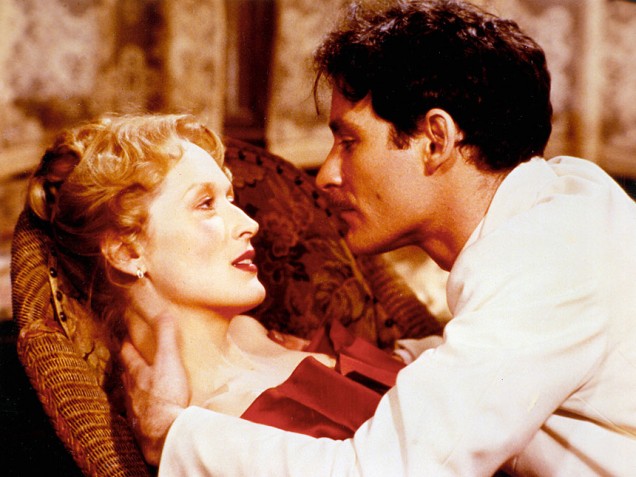 Streep and Kline in Sophie’s Choice
Streep and Kline in Sophie’s Choice
A recent survey of the Tea Party movement has revealed that the movement is overwhelmingly white, educated, middle class and conservative, and people are now studying what it all means. I love this post Ta-Tehisi Coates, a senior editor for The Atlantic. As occurs in the world of the blogosphere, Coates is responding to a response to a column, the column in this case being one by Charles Blow of The New York Times about the Tea Party’s lack of ethnic diversity. I write about the issue here because the awareness of diversity that Coates recommends can be fostered by novel reading. If we want to become deeper and wiser people, we must be prepared to put ourselves in uncomfortable situations and read uncomfortable books.
First, the argument. Blow attended a Tea Party rally that featured several speakers of color but emerged concluding that they were only invited to speak in order to reassure Tea Partiers that they weren’t racist. If that’s the case, then the Tea Party does indeed have a problem with racial and ethnic diversity.
Coates agrees with Blow, noting that “a mature and serious diversity doesn’t simply try to find people who already agree with the agenda.” Instead, it makes multicultural understanding and multicultural acceptance the agenda itself. The reason blacks traditionally align themselves with liberals, Coates says, is because “reconciling the country to its own diversity is at the core of modern liberalism–it’s the foundation to the house, not the paint-job.”
Coates acknowledges that this reconciliation is hard and that, in their dealings with each other over the years, both minorities and white liberals have had many uncomfortable moments. Nevertheless, the work they’ve done has been vital to the health of this country. Here’s the passage by Coates that most impresses me, perhaps because, as a white liberal, I have wrestled with this discomfort myself:
[D]iversity and tolerance are attempting to understand people who are radically different from you, and saying to them you want their voice in the process. Tolerance isn’t just a value you hold, so much as it’s something you do repeatedly. It’s uncomfortable. You fuck up. You go to parties where they play music that you don’t know how to dance to. You go to restaurants where the food is difference [sic]. You go to neighborhoods, where no one speaks English. The whole time people on the outside are laughing at you. The people you’re trying to understand get pissed at you, and call you racist, homophobe, bigot, sexist etc.
But they ultimately respect you for trying. And you get better. You pick up bits of a second language. You learn to like the food, to enjoy the music. And then one day you look up, and lo and behold, it seems like the whole world is dancing to that same music, eating that same food.
Reading certain novels is like entering one of these uncomfortable parties or restaurants. I’ve been writing about bubbles recently, and great novelists detest bubbles. They want creative engagement, not formulaic thinking. I’ve chosen here five novels, listed in no particular order, that have been almost painful for me to read but that have taught me a lot about people unlike myself. I invite my readers to send in their own choices.
–Richard Wright, Native Son – This was my first encounter with overt black anger and I was thoroughly unsettled. When I learned that this was an important college book for Supreme Court Justice Clarence Thomas, I came to understand him a bit better (even though I still disagree with most of his opinons).
—Philip Roth, The Human Stain – I have heard a lot about veterans suffering from post traumatic stress disorder (PTSD). This book, which seems to touch on virtually every hot button American issue, has a vet through whom we learn just how debilitating an illness it is.
–William Styron, Sophie’s Choice – I don’t know how realistic Styron’s depiction is of a concentration campus survivor who has had to make an infernal choice between her two children. But I can imagine that someone who has been through such a hell would be drawn to the destructive and self-destructive relationship that attracts Sophie.
–Arundhati Roy, God of Small Things – What pulls me to this work about (among other things) child abuse is the way that all the characters seem trapped in a web that is thousands of years old. One wants to assign blame and hold people responsible for their actions—but while it is true that we are accountable to an extent, Roy shows that there are also deeper currents at work.
–Emily Bronte, Wuthering Heights – This is a work that I have never been able to wrap my head around, maybe because I tend to approach life in a fairly rational manner. (I read novels in part to escape this rationality.) The character I am most like, I suspect, is Edgar Linton, the loving husband of Catherine whose life is upended when Heathcliff returns and blows the lid off of Catherine’s explosive passion.
Please send me your own favorite examples of works that have made you uncomfortable but have, at the same time, opened up important new horizons.

